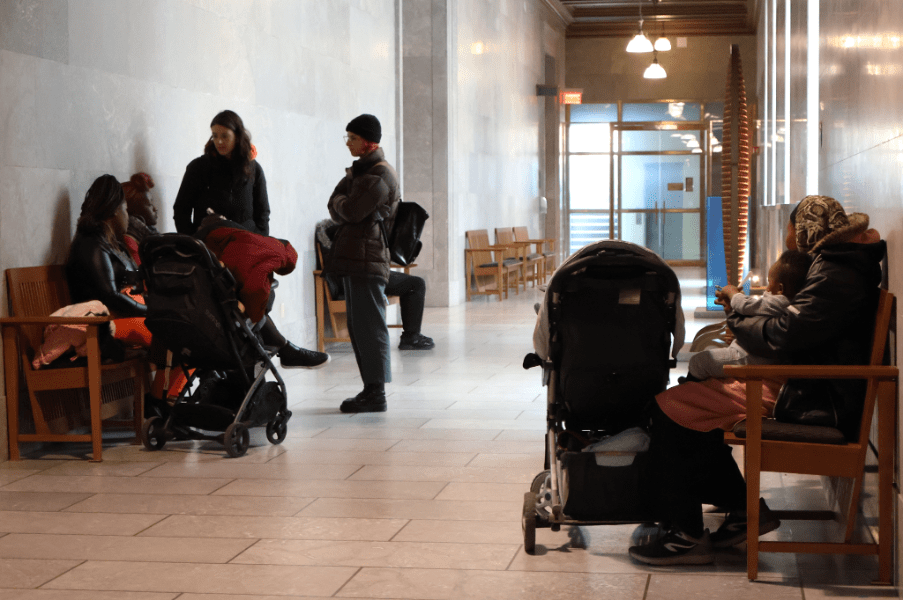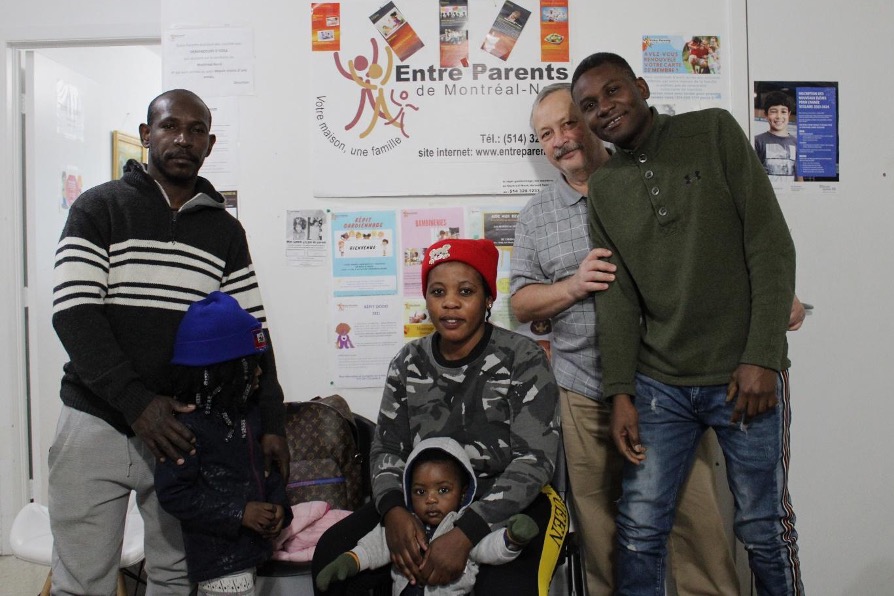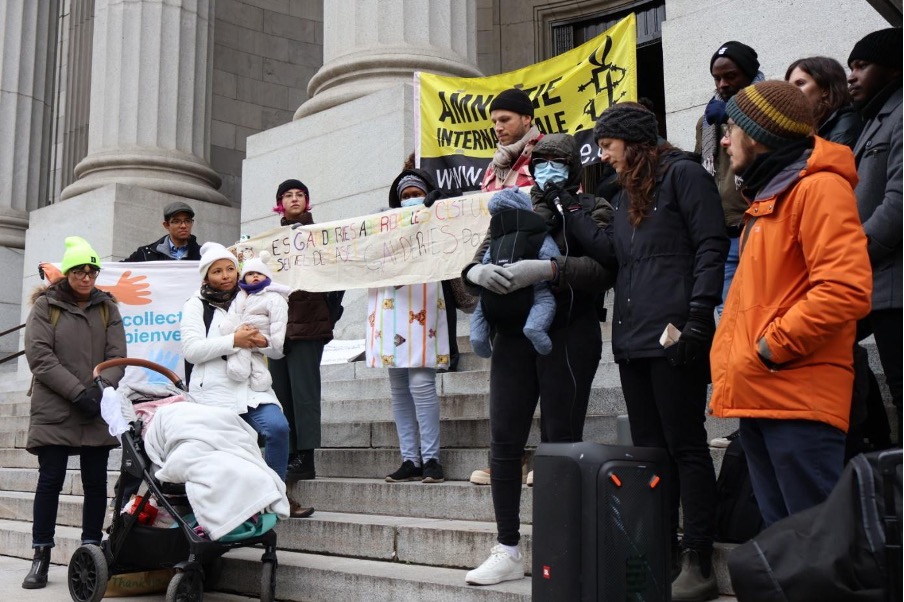This article was produced as part of an Inclusive Journalism Microcredential offered by New Canadian Media and Seneca Polytechnic. Learn more here.
While a five-year debate rumbles on in Quebec’s Court of Appeal over resuming child care benefits for asylum seekers, the rest of Canada is continuing to make preparations to welcome more people who are fleeing conflict and war back home.
In 2018, under Quebec’s former Liberal government of Philippe Couillard, the Ministry of Families decided to exclude asylum seekers from receiving subsidized child care benefits, by applying a new interpretation of Section 3 of the Reduced Contribution Regulation of the Educational Childcare Act.

In May 2019, asylum seeker Bijou Kanyinda took the current Quebec government, headed by François Legault’s Coalition Avenir Québec (CAQ), to court, saying the Liberals’ interpretation of the regulation was discriminatory in terms of gender, social status, and ethnic origin. Kanyinda has partnered with the Comité Accès Garderie (Daycare Access Committee), whose lawyers are arguing their case based on the Canadian Charter of Rights and Freedoms, and the Quebec Charter of Human Rights and Freedoms.
“It’s not as if they shop around their host province or country, and find out about the list of services offered to them before fleeing war and persecution,” Louis-Philippe Jannard, coordinator, protection component of TCRI, a collective or organizations that provide community services to immigrants and refugees, which is also a member of the committee, said in French, when asked about the challenges faced by asylum seekers in this context.
While deliberation continues, Entre Parents, a neighbourhood house in Montreal, has stepped in: Their free childcare service is provided four days a week, even if a single child can only attend once a week, so that more children of asylum seekers can benefit.

“Lack of access to public child care can have an impact on access to work, as well as child development and Francization,” Lucian Nica, immigration coordinator at Entre Parents, said in French, referring to the process of promoting and ensuring the use of the French language.
The Institut de la statistique du Québec reports that as of 2017, eight percent of children hadn’t attended child care programs, leading to poorer communication skills and general knowledge than their peers.
Asylum seeker Claudia Jean said in French that her children don’t benefit from any stimulating activities by simply staying at home. “With the exception of the TV,” she admitted, while James David Saint Val, another parent, added, also in French, “the government must think of us: education forms the basis of everything.”
Another mother, speaking on condition of anonymity, admitted that despite being nearly four, her child still isn’t able to speak French at all, which is crucial to integration to Quebec society. Parents are also forced to stay home to look after children, instead of finding work, which is vital to them beginning their new lives in Canada.
“Work is freedom,” said a Haitian asylum seeker, anonymously, who added that there was always someone back home to look after her family. “I can’t afford the luxury of leaving my children in daycare.”
Gracia Cricius, a restaurant worker, said in French that his partner was unable to work, leading to financial insecurity at home, saying, “I work to pay the rent, but it is not enough for our food expenses.”
Meanwhile, over in neighbouring Ontario, the federal government recently opened a new reception centre worth $7 million in the Peel Region, to process and house asylum claimants and provide them key services needed for them on arrival.
“There is no simple answer, but we are confident that with full engagement from all levels of government, we can implement real long-term, sustainable and compassionate measures to ensure that the most vulnerable newcomers to Canada have a roof over their heads,” said Kamal Khera, Minister of Diversity, Inclusion, and Persons with Disabilities, in a statement.
At a recent news conference at the CD Howe Institute in Toronto, Marc Miller, Minister of Immigration, Refugees and Citizenship, shed light on other efforts being taken to help protected persons such as refugees and asylum seekers.
“Getting our act together means a number of things…it means looking to the federal government for investments,” Miller added. “We’ve put a lot of money into the city of Toronto, we are looking to make additional investments, but it doesn’t come without assurances that the city of Toronto is also doing what it needs to do, and the province of Ontario is stepping up.”
Miller said the feds were also redistributing protected persons to other locations to which they consented to go, shortening the time required for them to receive vital services, and organising work permits for them so that vital labour shortages could be filled.
With the centre likely to be close to Toronto’s Pearson Airport, often the first point of arrival for people seeking safe harbour in Ontario, the opening of the new centre was also welcomed by Toronto Mayor Olivia Chow.
“This new reception centre has the potential to serve as the focal point of a coordinated regional response that ensures refugees have a safe place and a good start to their lives in Canada,” she said in a statement. “Next, we have to work together to address the needs of the thousands of refugees who have already arrived in shelters across the region, including the 5,100 the City of Toronto is currently supporting. We have an urgent homelessness crisis, Toronto’s shelters are full as we accommodate nearly 11,000 people each night.”
In Saskatchewan, subsidized child care is available for asylum seekers as defined in the Immigration and Refugee Protection Act (Canada), as detailed in Saskatchewan’s Child Care Regulations 2015, provided they have been granted Permanent Resident status, and are either employed, seeking employment, engaged in business, enrolled in education or training, or are receiving pre-employment services.
“Child care facilities have the authority to develop policies and procedures for the operation of their child care program,” added the Saskatchewan Ministry of Education, via email. “Facilities have the authority to determine who attends their facility.”
Meanwhile, in British Columbia, following the introduction of ChildCareBC in 2018, all families participating in licensed child care programs can save up to $900 a month through the Child Care Fee Reduction Initiative (CCFRI).
“All families in British Columbia, including asylum seekers, who access licensed child care at participating facilities are eligible to receive the CCFRI,” a spokesperson from the Ministry of Child Care and Education said by email. “There are also no eligibility requirements for families to access affordable child care at a $10 a day ChildCareBC centre.
“Families can also apply to receive additional support through the Affordable Child Care Benefit (ACCB) which provides up to $1,250 per month, per child to low- and middle-income families,” they added. There are over 13,200 child care facilities in British Columbia that offer services for less than $10 a day.
Over the last three years, Nova Scotia has welcomed 400 asylum seekers, providing them settlement services and the support they require, emailed Jenna MacQueen, communications advisor at the Government of Nova Scotia. People in Nova Scotia who earn under $35,000 per annum are eligible for the maximum child care subsidy. To be eligible for the subsidy, they may also not have more than $50,000 in savings and/or liquid assets.
“Subsidized child care is solely an income-based program, and if an applicant has income and assets within the allowable limit, they would qualify,” she said. “Citizenship status does not impact eligibility of the subsidy or access to spaces in regulated child care.”
Gautam is a journalist, editor and content writer skilled in both digital and print media, who brings with him more than a decade of editorial experience across five countries, including Canada and the US. A member of the Canadian Association of Journalists, Gautam worked as Deputy Editor of the Times of Oman before moving to Canada, where he continues to write on healthcare, education, human interest stories, sport, lifestyle, and science and tech. Gautam has a Masters' Degree in journalism from the UK, and is fluent in both English and French. He lives in Toronto.
Clément Lechat is a graduate of Journalism at Concordia University. He is interested in political reporting focusing on housing and marginalized communities. Passionate about academic research, Clément continues his education in the Digital Innovation in Journalism Studies Master’s Program.







